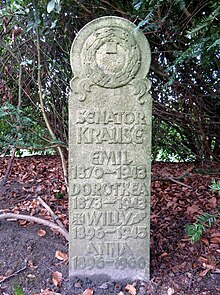Emil Krause
Emil Krause (born July 8, 1870 in Goslar ; † October 17, 1943 in Wintermoor ) was a German social democrat , reform pedagogue and school senator in Hamburg .
Life
Krause attended the teachers' seminar in Wolfenbüttel . In 1892, shortly before his final exam, he was put back by a year as a punishment for unauthorized visits to a pub. He then announced that he was leaving the seminary. His later request for readmission was denied, presumably because of his political beliefs. So he couldn't complete his teacher training .
His political commitment took him to Hamburg in 1893, where he became a member of the editorial team of the SPD newspaper Hamburger Echo . As the later head of the feuilleton , Krause worked with personalities from cultural life, including Alfred Lichtwark (director of the Hamburger Kunsthalle ) and Detlev von Liliencron . With them he organized numerous literary and artistic events in order to open the way to art for the Hamburg workforce . In his private life, Krause was interested in the theater and opera.
In 1894 he quoted verses by the poet Ferdinand Freiligrath on the occasion of a political speech at a memorial service for those who fell in March of the revolution of 1848 . He was sentenced to three months in prison for "inciting violence".
From 1907 Krause became a member of the Hamburg Parliament for the SPD , to which he belonged continuously until 1933.
On March 30, 1919, Krause was elected Senator (→ Hamburg Senate 1919–1933 ), he took over the school department. In 1920, when the young Weimar Republic was threatened by the Kapp Putsch in Berlin , he and a few teachers occupied the Hamburg telegraph office and thus thwarted the putschists' information policy.
Krause was a representative of a school structure policy that was supposed to enable access to secondary schools for children of all social classes. In 1920, Hamburg was the first federal state to set up advanced schools, which enabled students to take their Abitur after 7th grade .
Krause's 14-year term of office was marked by a period of reform education . School building also experienced a new heyday. 45 new schools were built during his tenure, including the Emil-Krause-Gymnasium , which was later named after him (from 2009 district school Barmbek, since 2019 Emil-Krause-Schule ). The architect Fritz Schumacher, in close contact with Krause, designed 31 of these schools into “lovingly developed” rooms for the new, humane pedagogy. In view of the beginning Nazi terror, Krause resigned from his position as school senator on March 3, 1933. The Hamburg teachers wrote in their testimony to their school senator: "Under his leadership, the school has seen a rise like never before."
In Operation Gomorrah in July 1943, Emil Krause was bombed out in Hamburg-Uhlenhorst . He died on October 17, 1943 and was buried in the Ohlsdorf cemetery in Hamburg in grid square AA 29 (southwest of chapel 6).
The obituary for Emil Krause was held by his close friend Rudolf Ross , a former elementary school teacher and first mayor . It ends with the words:
“Your works testify to your work, and even if you were not a poet, you could have said of yourself like the poet: 'Non omnis moriar!' I won't quite die. "
The Krausestrasse and the Emil Krause School in Hamburg-Dulsberg are named after Krause .
Web links
- Newspaper article about Emil Krause in the 20th century press kit of the ZBW - Leibniz Information Center for Economics .
Individual evidence
| personal data | |
|---|---|
| SURNAME | Krause, Emil |
| BRIEF DESCRIPTION | German politician (SPD), Member of the Bundestag and School Senator |
| DATE OF BIRTH | July 8, 1870 |
| PLACE OF BIRTH | Goslar |
| DATE OF DEATH | October 17, 1943 |
| Place of death | Winter moor |
